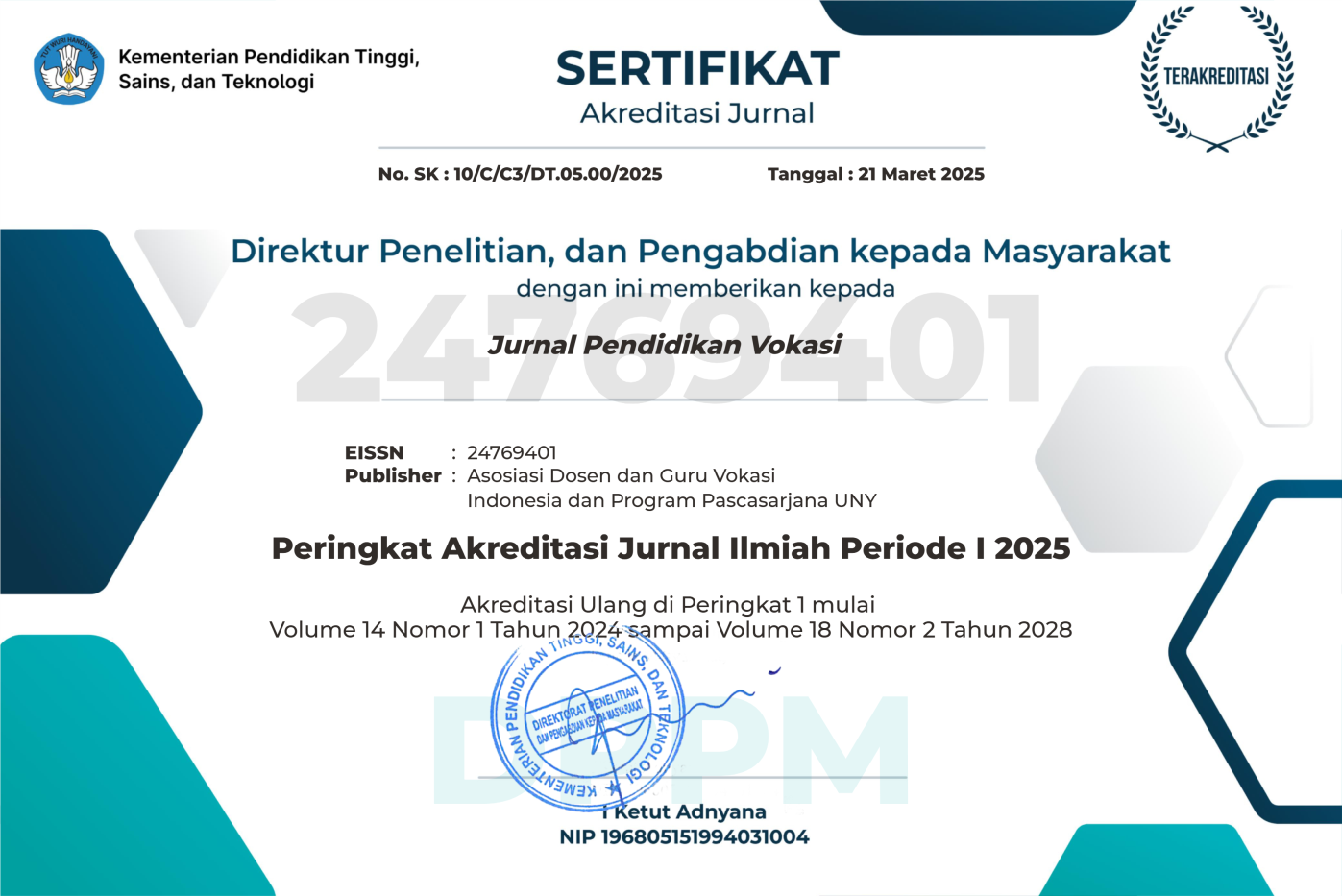Integration of strategy experiential learning in e-module of electronic records management
DOI:
https://doi.org/10.21831/jpv.v7i3.12812Keywords:
development, e-module, experiential learning, electronic records managementAbstract
This study aims to determine the effectiveness of e-module of electronic records management integrated with experiential learning strategies to improve student achievement in the domain of cognitive, psychomotor, and affective. This study is a research and development. Model research and development used is Web-Based Instructional Design (WBID) developed by Davidson-Shivers and Rasmussen. The steps of research and development carried out by analysis, evaluation planning, concurrent design, implementation, and a summative evaluation. The approach used in this study consisted of qualitative and quantitative approaches. Collecting data used the Delphi technique, observation, documentation studies and tests. Research data analysis used qualitative analysis and quantitative analysis. Testing the effectiveness of the product used a quasi-experimental research design pretest-posttest non-equivalent control group. The results showed that the e-module of electronic records management integrated with experiential learning strategies can improve student achievement in the domain of cognitive, psychomotor, and affective.
References
Al-Nuaimy, W., Zhang, J., & Noble, A. (2001). Web-based learning environment for a communications module. Computer Applications in Engineering Education, 9(2), 114–121. https://doi.org/10.1002/cae.1013
Anggraini, A., & Sukardi. (2015). Pengembangan modul prakarya dan kewirausahaan materi pengolahan berbasis product oriented bagi peserta didik SMK. Jurnal Pendidikan Vokasi, 5(3). Retrieved from https://journal.uny.ac.id/index.php/jpv/ar ticle/view/6484
Anonym. (2010). Experiential learning. Retrieved April 25, 2015, from www.unesco.org/education/tlsf/mods/ theme_d/mod20.html
Anonym. (2015). Importance of experiential learning. Retrieved January 20, 2016, from http:cas.msu. edu/ importance-of- experiential-learning
Arnanto, G. C., & Triyono, M. B. (2014). Keefektifan pembelajaran berbantuan internet di SMK se-kota Yogyakarta kompetensi keahlian teknik komputer dan jaringan. Jurnal Pendidikan Vokasi, 4(3). Retrieved from https://journal.uny.ac.id/index.php/jpv/ar ticle/view/2557
Arsip Nasional Republik Indonesia. Undang- Undang Nomor 43, Tahun 2009 tentang Kearsipan (2009).
Chavan, M. (2009). The Efficacy of web- based teaching in experiential learning. Ubiquitous Learning: An International Journal, 1(1).
Clark, R. W., Threeton, M. D., & Ewing, J. C. (2010). No Title. Journal of Career and Technical Education, 25(2). Retrieved from https://ejournals.lib.vt.edu/JCTE/article/ view/479/656
Creswell, J. W. (2010). Research design: pendekatan kualitatif, kuantitatif, dan mixed. Diterjemahkan oleh Achmad Fawaid. (`). Yogyakarta: Pustaka Pelajar.
Davidson-Shiver, G. V., & Rasmussen, K. L. (2006). Web-based learning: Design, implementation, and evaluation. New Jersey: Pearson Merrill Prentice Hall.
Holubar, S. D., Hassinger, J. P., Dozois, E. J., Wolff, B. G., Kehoe, M., & Cima, R. R. (2009). Impact of a multimedia e- learning module on colon cancer literacy: A community-based pilot study. Journal of Surgical Research, 156(2), 305–311. https://doi.org/10.1016/j.jss.2009.03.099
Johnson, B., & Christensen, L. (2008). Educational research: Quantitative, qualitative, and mixed approaches (3rd ed.). California: Sage Publication, Inc.
Krihanta. (2008). Akreditasi lembaga kearsipan provinsi dalam rangka meningkatkan layanan kepada masyarakat. Jurnal Kearsipan, 3(1). Retrieved from http://www.anri.go.id/assets/download/j urnal_kearsipan_Jurnal-Vol-3-2008.pdf
Magetsari, N. (2008). Organisasi dan layanan kearsipan. Jurnal Kearsipan, 3(1). Retrieved from http://www.anri.go.id/assets/download/j urnal_kearsipan_Jurnal-Vol-3-2008.pdf
Mawardi, Mudjiman, H., Anitah, S., & Asrowi. (2014). The Model of instructional design based on self- regulated learning using modular object oriented dynamic learning environment (MOODLE). Journal of Education and Practice, 5(22). Retrieved from http://www.iiste.org/Journals/index.php/ JEP/article/viewFile/14551/14860
Naina, A. (2008). Mengenal general international standard archival description, ISAD(G). Jurnal Kearsipan, 3(1). Retrieved from http://www.anri.go.id/assets/download/j urnal_kearsipan_Jurnal-Vol-3-2008.pdf
Norhayati, A. M., & Siew, P. H. (2004). Malaysian perspective: designing interactive multimedia learning environment for moral values education. Educational Technology & Society, 7(4), 143–152. Retrieved from http://www.ifets.info/journals/7_4/14.pd f
Nuramaliah, A., Damayanti, T. N., & Hidayati, H. (2016). Design and implementation e-learning based on LMS Moodle (case study SMK Prakarya Internasional). Retrieved September 12, 2016, from https:openlibrary. telkomuniversity.ac.id/pustaka/files/110 998/.../jurnal_eproc.pdf
Perlman, C., Weston, C., & Gisel, E. (2005). A web-based tutorial to enhance student learning of activity analysis. Canadian Journal of Occupational Therapy, 72(3), 153–163. https://doi.org/10.1177/000841740507200303
Prosser, C. A., & Quigley, T. H. (1950). Vocational education in a democracy. Chicago: American Technical Society.
Purnami, R. S., & Rohayati. (2013). Implementasi metode experiential learning dalam pengembangan softskills mahasiswa yang menunjang integrasi teknologi, manajemen dan bisnis. Jurnal Penelitian Pendidikan, 14(1).
Purnomo, A. J., Karsono, & Suharmanto, A. (2013). Penerapan model pembelajaran experiential learning berbantuan modul pada kompetensi mengunakan alat-alat ukur (measuring tools). Journal of Mechanical Engineering Learning, 2(2). Retrieved from https://journal.unnes.ac.id/sju/index.php/ jmel/article/view?path=
Sekretariat Kabinet Republik Indonesia. Instruksi Presiden Republik Indonesia Nomor 9 tahun 2016 tentang Revitalisasi SMK dalam rangka peningkatan kualitas dan daya saing sumber daya manusia Indonesia (2016).
Siberman, M. (2007). The handbook of experiental learning. San Fransisco: Pfeiffer.
Sutirman. (2015). Urgensi manajemen arsip elektronik. Efisiensi : Kajian Ilmu Administrasi, XIII(1). Retrieved from https://journal.uny.ac.id/index.php/efisie nsi/article/view/7861
Thomson, J. F. (1973). Foundations of vocational education: social and philosophical concepts. Englewood Cliffs, New Jersey: Prentice-Hall, Inc.
Utami, S., & Soenarto. (2015). Peningkatan motivasi, kemandirian dan hasil belajar melalui pembelajaran kooperatif pada pembelajaran dasar sinyal audio. Jurnal Pendidikan Vokasi, 5(1). Retrieved from https://journal.uny.ac.id/index.php/jpv/ar ticle/view/6068
Wiersma, W. (1995). Research methods in education: An introduction. Massachusetts: A Simon and Schuster Company.
Downloads
Published
How to Cite
Issue
Section
Citation Check
License
The authors submitting a manuscript to this journal agree that, if accepted for publication, copyright publishing of the submission shall be assigned to Jurnal Pendidikan Vokasi. However, even though the journal asks for a copyright transfer, the authors retain (or are granted back) significant scholarly rights.
The copyright transfer agreement form can be downloaded here: [JPV Copyright Transfer Agreement Form]
The copyright form should be signed originally and sent to the Editorial Office through email to jpvokasi@uny.ac.id
Jurnal Pendidikan Vokasi by http://journal.uny.ac.id/index.php/jpv is licensed under a Creative Commons Attribution-ShareAlike 4.0 International License.












